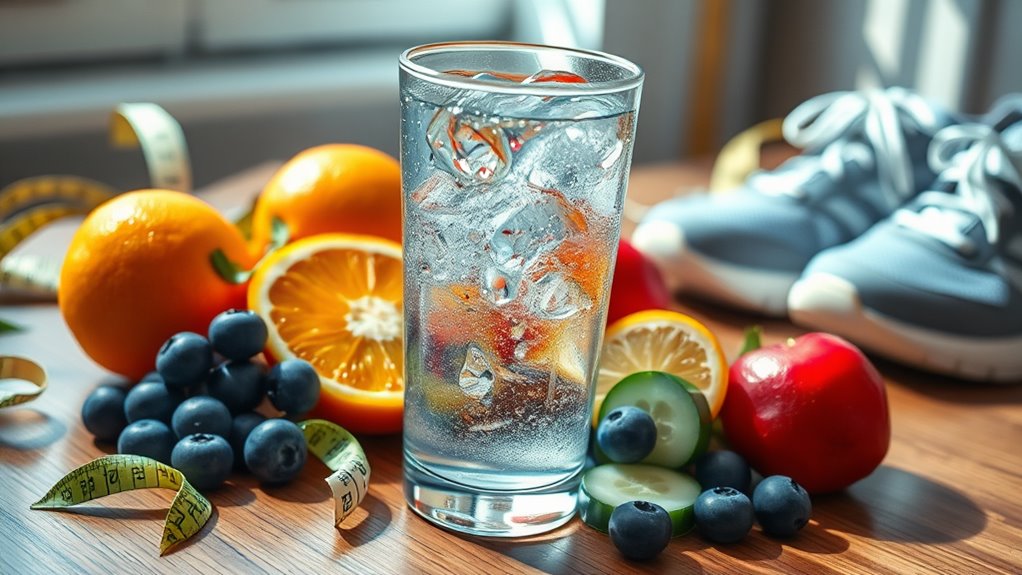Staying hydrated is essential for weight loss because it boosts your metabolism and helps control hunger. When you're well-hydrated, your body converts food into energy more efficiently. Mild dehydration can slow down your metabolism and make you feel sluggish. Additionally, drinking water regularly can curb appetite, reducing unnecessary snacking. Hydration also optimizes your exercise performance, allowing you to work out harder and recover better. By understanding your hydration needs and incorporating water strategically throughout your day, you can support your weight loss journey. There's more to explore about effective hydration strategies that can enhance your results.
Key Takeaways
- Adequate hydration supports metabolic rate, enhancing calorie burning and aiding weight loss efforts.
- Drinking water before meals can help control appetite and reduce overall calorie intake.
- Proper hydration improves energy levels, making it easier to maintain an active lifestyle and promote weight loss.
- Water consumption aids digestion and nutrient transport, which are essential for effective weight management.
- Staying hydrated prevents fatigue and maintains stamina during workouts, optimizing exercise performance for better weight loss results.
Importance of Hydration
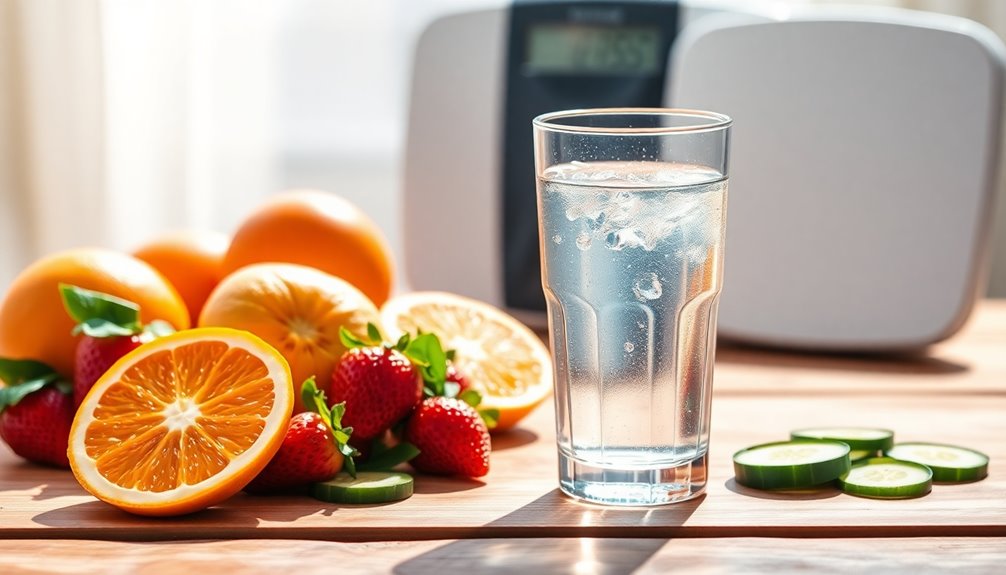
Hydration plays a crucial role in your overall health and weight management. When you prioritize your water consumption, you access a range of hydration benefits that enhance your well-being and support your weight loss goals. You mightn't realize it, but even mild dehydration can negatively impact your energy levels and mood, making it harder to stick to healthy habits.
By ensuring you're drinking enough water throughout the day, you can improve your body's ability to regulate temperature, transport nutrients, and facilitate digestion. Research suggests that adequate hydration can also help curb your appetite. When you drink water before meals, you might feel fuller, which can lead to reduced calorie intake. This simple strategy can be a game-changer for your weight loss journey.
Moreover, staying hydrated supports your metabolism, allowing your body to efficiently convert food into energy. Water consumption is essential for the breakdown of carbohydrates and fats, which means that drinking enough water can positively affect your energy levels during workouts and daily activities. Understanding the energy stored in food is key to effective weight management.
To make hydration a habit, carry a water bottle with you and set reminders to drink throughout the day. You might also consider incorporating hydrating foods, like fruits and vegetables, into your diet. Embracing these practices not only nurtures your body but also fosters a sense of belonging in a community that values health and wellness. By prioritizing hydration, you're not just supporting your weight loss efforts; you're investing in your overall quality of life.
How Water Affects Metabolism
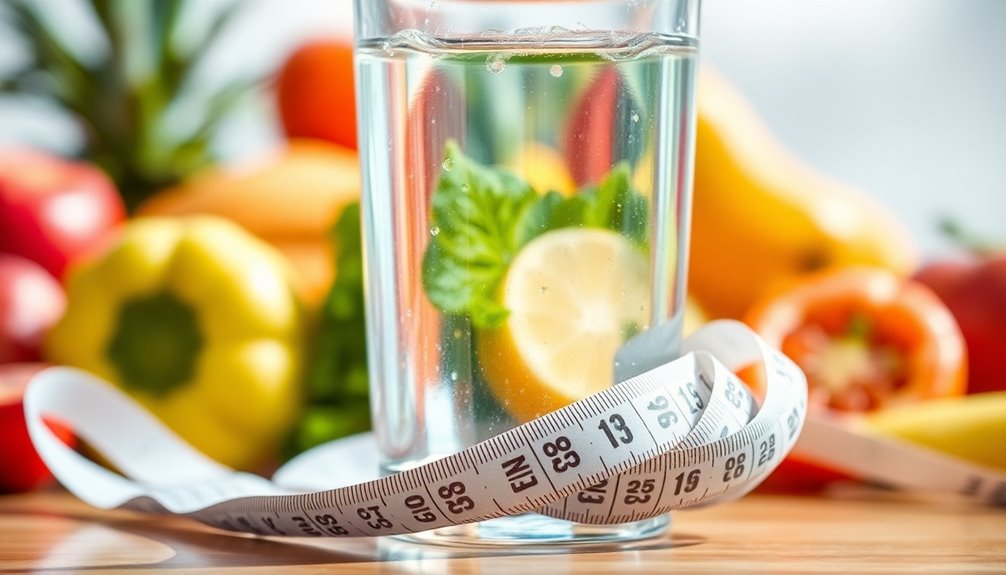
Water plays a vital role in boosting your metabolism, helping your body efficiently convert food into energy. When you're well-hydrated, your digestive system works optimally, enhancing the process of breaking down nutrients and absorbing them effectively. Dehydration can slow down your metabolic rate, making it harder for you to utilize energy from the food you consume.
Studies have shown that drinking water can temporarily increase your metabolic rate by up to 30%. This spike in metabolism occurs within minutes and can last for over an hour. When you stay hydrated, you're not just supporting hydration and digestion; you're actively fueling your body's energy needs. Water also helps transport nutrients throughout your body, ensuring your cells receive the energy they require for daily activities.
Additionally, drinking cold water can further boost your metabolism. Your body expends energy to heat the water to body temperature, creating a small caloric burn. This simple habit can contribute to your overall energy expenditure, especially when practiced consistently. Furthermore, optimizing your oxygen intake can enhance the effectiveness of your metabolism and energy utilization during weight loss efforts.
Incorporating sufficient water intake into your daily routine can also enhance your exercise performance. When you're hydrated, you can engage in more intense workouts, which further promotes calorie burning and energy production.
Hydration and Appetite Control
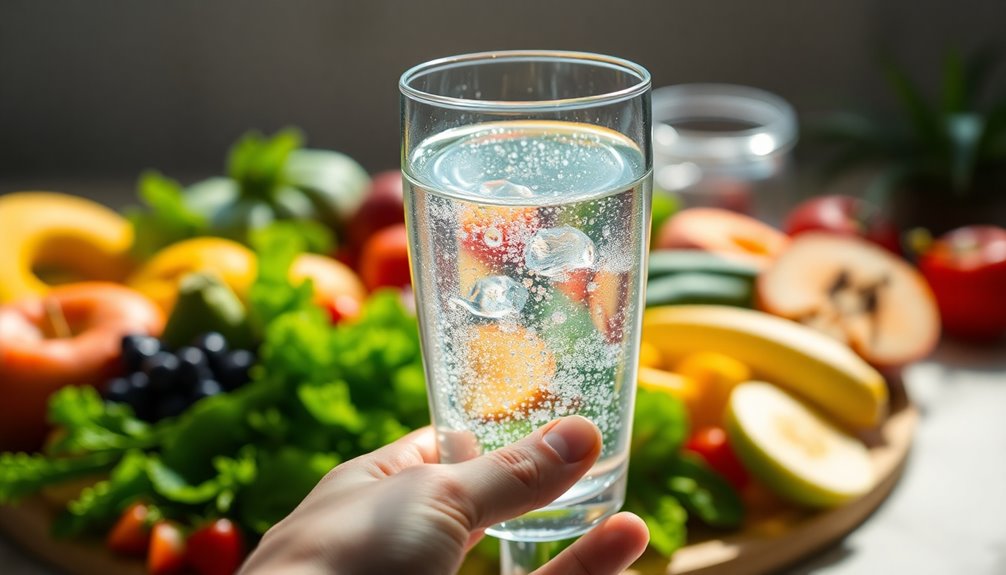
Maintaining proper fluid intake can greatly impact your appetite control. When you're dehydrated, your body may confuse thirst signals with hunger, leading you to eat when you really just need water. This miscommunication can result in unnecessary calorie consumption, hampering your weight loss endeavors. By ensuring you're adequately hydrated, you can help your body distinguish between true hunger and thirst.
Studies have shown that adequate water intake can reduce feelings of hunger. When you drink water before meals, it can create a feeling of fullness, which may lead you to consume fewer calories overall. This is especially beneficial if you're aiming for a healthy weight. Additionally, drinking water instead of sugary beverages not only helps you stay hydrated but also curtails excess calorie intake, aligning with your weight loss objectives.
Aim to drink water consistently throughout the day. Keeping a water bottle nearby can remind you to stay on track with your hydration. When you notice those thirst signals—like a dry mouth or fatigue—try reaching for water first instead of a snack. It's a simple yet effective strategy that can enhance your appetite control and promote healthier eating habits. Additionally, research from the Emory University School of Medicine indicates that proper hydration can play a crucial role in metabolic processes that are vital for weight management.
Incorporating more water into your daily routine can also foster a sense of belonging within wellness communities. As you share tips and experiences with others on similar journeys, you'll find that staying hydrated becomes a collective goal, reinforcing your dedication to a healthier lifestyle.
Water's Role in Exercise
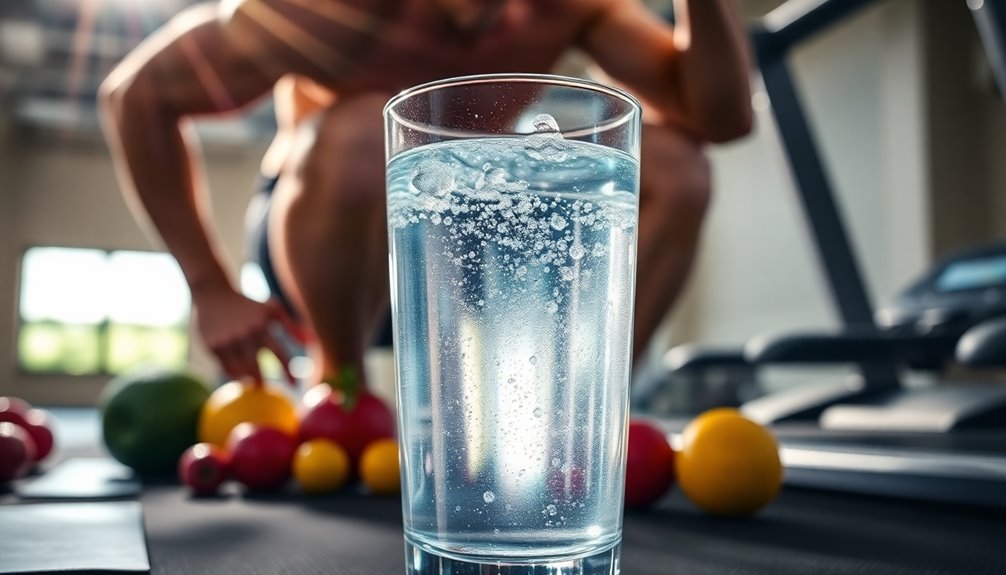
Staying properly hydrated is necessary for maximizing your exercise performance and recovery. Water plays a pivotal role in maintaining your electrolyte balance, which is essential for muscle function and overall performance. When you exercise, you lose fluids through sweat, and understanding your sweat rate can help you determine how much water you need to stay on top of your game.
Here's a quick reference table to help you understand your hydration needs based on different intensities of exercise:
| Exercise Intensity | Sweat Rate (liters/hour) | Recommended Water Intake (liters/hour) |
|---|---|---|
| Low | 0.5 | 0.5 |
| Moderate | 1.0 | 1.0 |
| High | 1.5 | 1.5 |
| Very High | 2.0+ | 2.0+ |
During workouts, if you're not replacing the fluids lost, you risk dehydration, which can lead to decreased stamina, increased fatigue, and impaired recovery. Electrolytes like sodium and potassium help to maintain your body's fluid balance, so consider replenishing those as well, especially during longer sessions. Incorporating mini bands into your routine can enhance your workout effectiveness while also encouraging proper hydration practices.
Hydration Strategies for Weight Loss
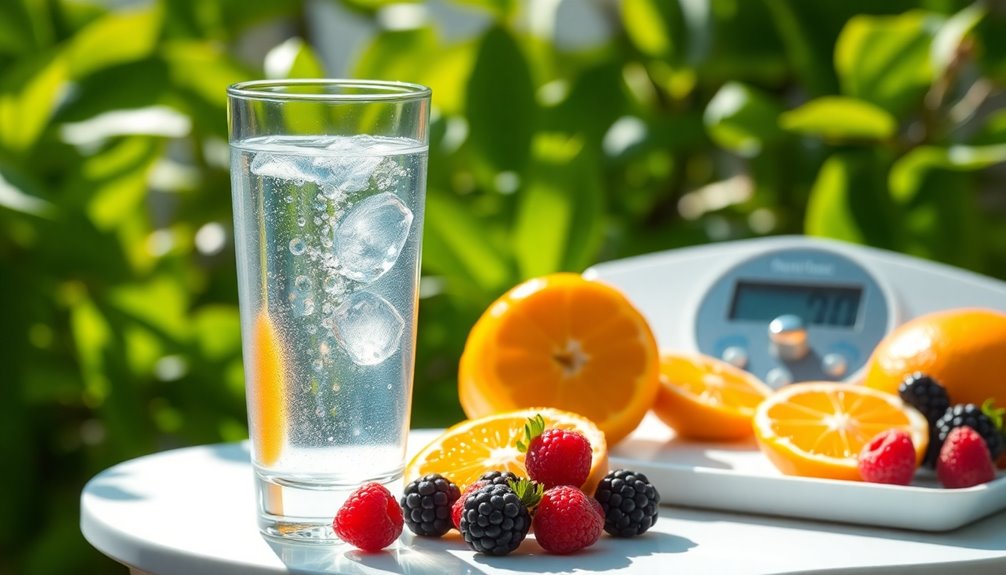
When it comes to weight loss, effective hydration strategies can make a significant difference in your progress. Staying well-hydrated not only supports your metabolic rate but also helps control hunger cues that can derail your efforts. To optimize your hydration, focus on timing and electrolyte balance.
First, consider hydration timing. Aim to drink water throughout the day rather than chugging large amounts at once. Start your morning with a glass of water to kickstart your metabolism. Continue sipping water before meals; this can help you feel fuller, potentially leading to reduced calorie intake. Additionally, keep a water bottle nearby during workouts to maintain hydration levels and enhance performance.
Next, don't overlook the importance of electrolyte balance. When you sweat, you lose essential minerals like sodium, potassium, and magnesium. Replenishing these electrolytes not only keeps your body functioning properly but also helps stave off cravings. You might want to incorporate electrolyte-rich foods like bananas and leafy greens into your diet or consider low-calorie electrolyte drinks during intense workouts. Drinking water from SlimCrystal bottles can also enhance hydration and support weight loss efforts.
Lastly, set daily hydration goals. Aim for at least eight 8-ounce glasses of water daily, adjusting based on your activity level and climate. By implementing these hydration strategies, you'll support your weight loss journey and foster a sense of community with others who share similar goals. Remember, you're not alone in this—every small step counts!
Common Myths About Hydration
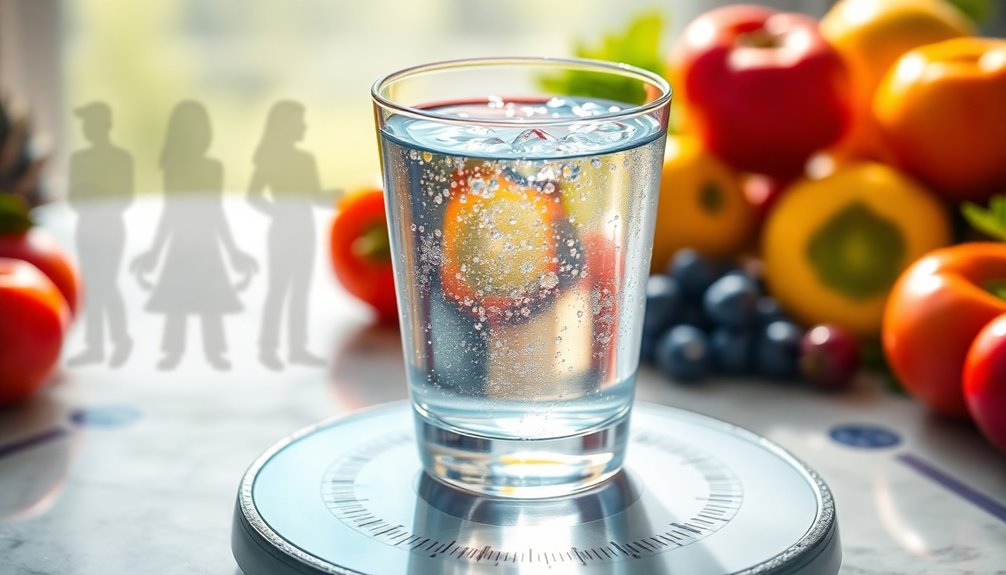
Although many people believe they know the ins and outs of hydration, several common myths can mislead you about its role in health and weight loss.
One prevalent myth is that drinking excessive water can greatly improve your skin's appearance. While proper hydration does help maintain skin elasticity, it won't necessarily eliminate wrinkles or other skin issues. A balanced diet and skincare routine play just as important a role.
Another misconception is that hydration alone boosts energy levels. Dehydration can lead to fatigue, but simply drinking more water won't instantly revitalize you. Instead, maintaining a consistent intake of fluids throughout the day to support optimal energy levels is crucial, especially if you're active. Pairing hydration with a well-rounded diet rich in nutrients is essential for sustained energy.
Some folks also believe that drinks like coffee or tea don't count toward hydration. While these beverages can have a mild diuretic effect, they're still hydrating when consumed in moderation. You don't need to limit yourself to plain water; variety can help keep your hydration routine enjoyable.
Lastly, many think they should drink eight glasses of water daily without considering individual needs. Factors like activity level, climate, and diet can all influence your hydration needs. Listen to your body and adjust your intake accordingly. By dispelling these myths, you can better understand how hydration truly impacts your health and weight loss journey. Additionally, proper hydration can enhance your body's ability to support lean muscle building, which is particularly important for effective weight loss and overall health.
Frequently Asked Questions
Can Drinking Water Help With Skin Health During Weight Loss?
Drinking enough water can greatly enhance your skin health, especially during weight loss. Proper hydration helps maintain your complexion, reducing the appearance of wrinkles.
As you lose weight, your skin might become less elastic, but sufficient water consumption can counteract this effect. By keeping your skin hydrated, you promote a youthful appearance and support overall skin function.
Does Hydration Impact Energy Levels and Fatigue While Dieting?
Hydration greatly impacts your energy levels and fatigue, especially when you're dieting. When you increase your water intake, you boost your metabolism, which can improve exercise performance.
Staying well-hydrated helps your body function efficiently, preventing that sluggish feeling that often accompanies dieting. It's essential to drink enough water to keep your energy up and support your overall well-being.
Are There Specific Drinks Better for Hydration Than Plain Water?
You might think plain water's the only way to hydrate, but that's a hydration myth! Drinks with electrolytes can actually help maintain your electrolyte balance, especially after workouts.
Coconut water and certain sports drinks not only quench your thirst but also replenish essential minerals.
How Does Caffeine Affect Hydration and Weight Loss Efforts?
Caffeine intake can have mixed effects on hydration. While it's a mild diuretic, recent studies show it doesn't notably increase water loss in moderate amounts.
However, if you rely heavily on caffeinated drinks, you mightn't be consuming enough water. Balancing your caffeine with adequate water consumption is essential for staying hydrated.
If you're focused on weight loss, consider limiting caffeine, as it can sometimes lead to increased cravings or decreased sleep quality.
Can You Overhydrate and Negatively Affect Your Weight Loss Journey?
When it comes to hydration, you can't judge a book by its cover. Yes, you can overhydrate, which throws your hydration balance off and can lead to weight loss risks. Too much water dilutes electrolytes, impacting bodily functions and causing fatigue.
While staying hydrated is crucial, moderation is key. Keep an eye on your intake and listen to your body to guarantee you're supporting your weight loss journey effectively.
Conclusion
Just as a well-tended garden thrives, your body flourishes with proper hydration. By nurturing it with enough water, you boost metabolism, control appetite, and enhance exercise performance. Think of water as the sunlight that helps your weight loss journey bloom. Embrace hydration strategies daily, dispelling myths that cloud your path. Remember, every drop counts in cultivating the vibrant health and weight you aspire to achieve. Stay hydrated, and watch your efforts blossom into success.

